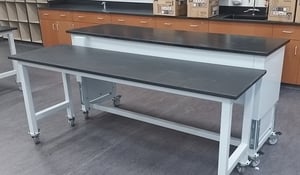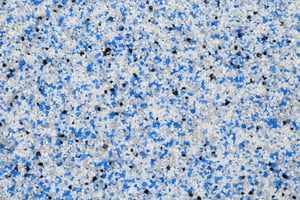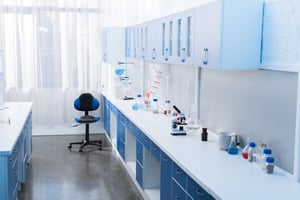Solid surface countertops are a go-to in laboratories across the world because of their numerous benefits and durable construction.
While these benefits often put solid surface countertops at the top of your list of laboratory grade materials you are considering, it’s important to consider that there are multiple types of solid surface countertops.
Below we will break down three common types of solid surface countertops to help you determine which is best for your workspace:
- Phenolic Resin
- Epoxy Resin
- Solid Surface
Phenolic Resin
Many labs today are turning to phenolic resin because of its durability and ability to withstand harsh conditions.
harsh conditions.
How Phenolic Resin Countertops Are Made
Phenolic resin countertops are manufactured by layering natural kraft paper that has been saturated with phenolic resin and processed under high heat. This forms one solid, lightweight countertop.
Phenolic resin is a compound that combines phenol and formaldehyde, which creates a large network of permanently bonded molecules. Phenol formaldehyde resin properties vary based on the balance between phenol and formaldehyde, as well as whether the catalyst is an acid or a base.
One example of how properties can vary is when using water and a base with excess formaldehyde. This creates a polymer called a resole, which is often used with heat and pressure to create a strong bond between layers of plywood. This creates a very durable product that can benefit environments that are routinely exposed to water or harsh conditions.
Another example is when excess phenol and an acid catalyst are combined. This is called a novolak. The resulting thermoplastic is ground into a powder, mixed with a filler and used in heated and pressurized molds. You’re more likely to see this material in heat-resistant objects like cookware or electrical connectors.
Advantages Of Phenolic Resin Countertops
A phenolic resin countertop offers a large number of advantages, making it a great option for environments that have harsh conditions like use of chemicals and excessive moisture.
Advantages of phenolic resin countertops include:
- Moderate duty
- High bacterial resistance
- High chemical resistance
- Moderate to high corrosion resistance
- High fungal resistance
- High moisture resistance
- High scratch resistance
- Continuous heat exposure up to 350 degrees F
- Holds up well to impact and stress fractures
- Lightweight for easier installation
Phenolic resin countertops are often designed as one solid piece that can be made into almost any configuration or shaped to the required size.
Disadvantages Of Phenolic Resin Countertops
Phenolic resin countertops are not flame retardant, so if your workspace regularly uses open flames, this type of material for your lab countertops might not be the best choice.
Best Applications For Phenolic Resin Countertops
Phenolic resin is often a popular choice in biological, chemical, clinical and analytical labs where results depend on non-contamination and require lab countertops that are exceptionally chemical resistant, impervious and hygienic.
Cost Of Phenolic Resin Countertops
Phenolic resin suppliers typically charge between $15 and $18 per square foot, although that price can increase based on modifications specific to the lab’s needs.
Epoxy Resin
Epoxy resin is another solid surface material often found in environments where harsh conditions exist.
conditions exist.
How Epoxy Resin Countertops Are Made
Epoxy resin countertops are made from a mixture of materials. This mixture is then cured as a solid continuous product. These materials primarily include epoxy resin and silica, but also typically include a hardener and a filler.
Epoxy resin materials are then molded and oven cured, with the heat permanently setting the material into a solid slab. Manufacturers can modify the properties of the mixture to create customizations such as color.
While epoxy resin has become a popular DIY project online, it’s important to note that there is a difference between laboratory-grade epoxy resin and epoxy resin used for home projects. It is important to ensure that any epoxy resin product you buy is tested for best practices and can withstand the harsh conditions of your space.
Advantages Of Epoxy Resin Countertops
Like phenolic resin, epoxy resin can withstand conditions often found in laboratories. Advantages of epoxy resin countertops include:
- Heavy duty
- High bacterial resistance
- High fungal resistance
- High corrosion resistance
- High chemical resistance
- High scratch resistance
- Continuous high heat exposure above 350 degrees F
- Flame retardant
- Hold up to impact and stress fractures
Epoxy surfaces also resist discoloration, blistering and cracking even under the harshest conditions. The extreme chemical and heat resistance means epoxy work surfaces will likely appear new even after years of hard work.
Disadvantages Of Epoxy Resin Countertops
One of the biggest cons of epoxy resin countertops is the cost, which we’ll dive into more below. Epoxy resin is one of the most expensive countertop materials.
Another disadvantage is that few manufacturers make epoxy resin countertops, so you may have a longer lead time than if you were to choose another material.
Best Applications For Epoxy Resin Countertops
Epoxy resin is often found in educational, hospital, medical, research, pharmaceutical, biological science, microbiology, biomedical, molecular pathology and industrial testing labs because of its ability to withstand high heat sources and other harsh conditions.
Cost Of Epoxy Resin Countertops
Epoxy resin countertops can cost as much as $100 to $200 per square foot. Epoxy resin is a heavy product as well, which can contribute to additional shipping costs. It is also a very rigid product, so if you want to customize it, you may face higher order costs since a high level of expertise is needed to achieve a more personalized look.
Solid Surface
Although phenolic resin and epoxy resin are types of solid surface countertops, a third type is referred to as simply “solid surface.” Here’s what distinguishes solid surface from the other two.
is referred to as simply “solid surface.” Here’s what distinguishes solid surface from the other two.
How Solid Surface Countertops Are Made
Solid surface countertops contain a non-porous, homogeneous material that consists of the same composition throughout. Solid surface is similar to plastic in that it is usually made from a resin and features a filler material. The end result is around 66% minerals and 33% binding resins.
Resin materials can vary from acrylic to polyester and plastic. The mineral portion often depends on what the client envisions for the countertop’s final look. The mineral portion also typically includes aluminum trihydrate (ath), which is a fine white powder that gives solid surface countertops their smooth appearance.
When manufacturers make solid surface countertops, they mix the minerals and binding resins with a powdered filler and pigments. These fillers and pigments can create a unique look that mimic the appearance of granite, marble, quartz, natural stone and even wood. Pigments provide customized colors that allow you to match color schemes at workplaces.
After the mixture chemically cures, workers heat it to 140 degrees F. This forms a solid material that designers can customize to a specific size and shape. You can also customize your solid surface countertop so that it can withstand a greater level of heat.
Advantages Of Solid Surface Countertops
One of the qualities of solid surface countertops that makes them so attractive is that they can be customized in a variety of colors and patterns. In addition to mimicking the appearance of natural minerals, solid surface counters come in a variety of finishes, colors and uses:
- Finishes: Gel coating, gloss, matte and textured appearances
- Colors: A palette of options, from beige hues to warm golds, rich blues and vibrant reds
- Uses: Countertops, as well as can be molded to create sinks, backsplashes and other fixtures found in manufacturing and laboratory spaces
You can also choose from a wide assortment of edge treatments and inlays that create customized looks. You can read more about these customization opportunities in our article, Solid Surface Countertop Detail: 4 Ways To Customize.
Other pros of solid surface countertops include:
- Invisible seams
- Non-porous surface (keeping bacteria, mildew and stains away)
- High impact resistance
- Easy maintenance
- Easy to repair when minor damage occurs
Disadvantages Of Solid Surface Countertops
Solid surface countertops have some distinct disadvantages as well, including:
- Lower resistance to harsh conditions, like chemicals and high heat
- More prone to scratches
- Glossy finishes can require higher level of care
- May show more imperfections
- Polyester-based surfaces are more fragile
Best Applications For Solid Surface Countertops
Solid surface countertops thrive in environments where there are high levels of moisture and water because of their nonporous features. These environments include offices and labs that require hygienic areas, like doctor’s offices and dental offices.
Cost Of Solid Surface Countertops
Solid surface countertops cost between $50 and $200 per square foot. Many factors can influence the final price, from the level of heat resistance required for your workspace to pigments added and special finishes.


